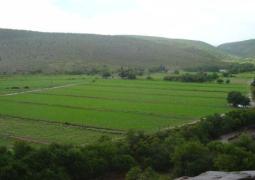
The advent of Covid-19 changed everything, including plans of the Department of Human Settlements that were presented previously to a mini-plenary budget debate vote of the National Assembly (NA) – and the pandemic has changed even the way people live. That was what the Minister of Human Settlements, Water and Sanitation, Ms Lindiwe Sisulu, told Members of the NA yesterday.
Presenting her budget debate speech for the Department of Human Settlements, Ms Sisulu said Covid-19 has agitated for solutions here and now. “It incidentally thrust innovation in our face. It created a certain urgency around making sure that people are protected from the elements and consequently most of the plans we laid out had to be delayed,” she said.
Ms Sisulu said the plans have been replaced by an even greater drive to deliver more, deliver differently, deliver faster. “Driven by the pandemic, what we have been able to achieve in the past five months has been nothing but outstanding. It may not have been part of our original plans, but it showed our ability to respond to any situation as it unfolded,” she added.
She said at the back of this pandemic they have gained greater impetus, provided society with greater insight into the urgency and need for shelter and showed the department for what it is – ‘a caring department, ready to reach out and find solutions to most of the problems we encountered, including, unfortunately evictions and invasions”.
Ms Sisulu highlighted the successes of her department in her speech, and those successes include the innovative ways they have used to house the people, notably the community of Wilgeheuwel in Roodepoort. She said in less than three weeks they were able to provide 70 families with decent shelter, water and sanitation.
She said in the Eastern Cape, we are on-site building 1 000 TRUs in Buffalo City at Duncan Village. These will also allow us to fast-track the implementation of the Duncan Village housing project, which has been delayed for a while though court processes.
In Gauteng, she said they have TRUs being rolled out to provide space for social distancing and future development of the informal settlements. Among others, Zandspruit will yield 1 402 units, Tanganani Ext 7 will yield 1 108, and Rabbie Ridge will yield 1 200 units. In the immediate term, she said, the Housing Development Agency (HDA) will assist the government to build 6 371 TRUs of these units across the country – with other provinces such as KwaZulu-Natal, Limpopo, and Eastern Cape building more with the private sector.
She told members of the National Assembly that Human Settlements has the greatest ability to turn around the South African economy after the pandemic. “We have shown the private sector, we have shown the donor community, and we have shown our people that we are a dependable team. We would like them to invest in us, support us and join us in our work to achieve a more equitable social order. Mass housing delivery will provide us with what the Marshall Plan provided Western Europe [after the Second World War],” she said.
She said currently they are readying themselves and their institutions to anchor human settlements as the biggest catalyst for reinvigorating the economy after the pandemic. Recently, she said as part of the response to Covid-19, her department fast-tracked the launch of Elijah Barayi Mega Project in Gauteng, where 1 500 approved beneficiaries from Khuthong Informal settlements are being relocated into their homes.
Hostels have also been identified as overcrowded spaces that would place our people in danger. In line with this, her department has identified Mamelodi Hostel, which is one of the most overcrowded hostels in the country. For the de-densification programme there, they are currently constructing more than 1 000 temporary residential units for the residents of the hostel.
Ms Sisulu said, together with the provinces, her department is working with communities and municipalities to incrementally upgrade more than 300 informal settlements to improve living conditions of households. She said R2.4 billion and R2.2 billion has been allocated to provinces and metros respectively in the current budget, towards the upgrading of informal settlements.
“The need to improve living conditions in informal settlements became even more pressing. The upgrading plans that were already agreed with communities and municipalities needed to be implemented instantly,” she added.
On title deeds, she said: “We maintain our focus to eradicate backlogs in registering title deeds. As we stated before, a title deed empowers a household to be certain of the ownership of the house they live in and frees them to participate in the property market.”
In that regard, she said the priority is to complete all the outstanding township proclamations required to register title deeds. The funding for title deeds will henceforth form part of the Human Settlements Development Grant, and so forms part of the mainstream programmes.
On land grabs and evictions, she said: “We will resist the unlawful occupation of land in the same way that we have resisted the eviction of people. The Constitution is very clear on these and the processes to be followed. Lawlessness does not reflect progressive ideals.”
By Mava Lukani
21 July 2020

